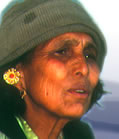THEMES IN THIS
TESTIMONY
Agriculture

Health

Migration

Social Relationships

Click on arrows
to find more
testimonies
featuring
these themes
|
|
Sex
|
Female
|
|
|
Age
|
60
|
|
|
Identity
|
Tamang
|
|
|
Occupation
|
farmer
|
|
|
Location
|
Kavre district
|
|
|
Date
|
2002
|
|
summary
Shuvalakshmi is a farmer, and raised nine children – five of whom have died – on her own, as her husband got work as a gardener in Kathmandu, in the government offices. Although many of her responses are quite short, and the testimony is not the most informative in the collection, she does provide details of daily life – particularly of women – and how this has changed over the years. Improved maternal health has made a big difference: childbirth is less risky, and fewer children die so mothers can adopt family planning measures after one or two babies. Shuvalakshmi says she was lucky and had quick labours; she even gave birth to some of her children before she’d come back home from gathering fodder.
She is evidently proud of the fact that she is still strong, and claims that this is due to working hard. She describes some of the tasks she used to do: “I had to look after cattle, cut grass and work in the field. With the husband at work, and children very young, I had to do everything.” She feels that today people “have become spoilt”. She claims that while some women still work hard raising buffaloes, for those who don’t have to, life has become easy. She talks particularly disparagingly about her own daughters-in-law and it is evident that there are some problems between them.
Like many men in the village her sons have gone away for work. Both are in Kathmandu and as a result her grandchildren “live in comfort compared to us…they can eat whatever they desire and wear what they want.” However, despite the difficulties with her daughters-in-law she concludes the testimony explaining that she prefers life in the village to that in the city: “I’ve been there many times, but I still like it here… In fact, if one has to travel outside Kathmandu and go towards the Terai (the sub-tropical plains of Nepal) the drinking water is so warm. It is water that makes it difficult for me. I don’t like to go anywhere.”
detailed breakdown
|
You will need a password from Panos to view the full
transcript of the interview. To apply for a password, click here.
Once you have a password, click here to go to the beginning
of the transcript. You can also click on any section of the
breakdown of content below and go straight to the
corresponding part of the transcript.
|
| Section 1 |
She has been married for 40 years, and grows corn, wheat and barley. They are not self-sufficient and the men have to migrate for work.
|
| Section 2 |
More discussion on crops. While corn yields have increased; “Soya bean, beans, masyam (kind of lentil)… don’t do well now.” She feels both changes are due to chemical fertiliser use.
Describes carrying soya beans to market on their backs. Now people “have become spoilt…All they do now is eat good food and wear good clothes.” She struggled doing all the household and farm work alone while her husband was working.
|
| Section 3 |
Describes her work and daily activities. Collecting forest products: “the body would be completely covered by leeches.”
She no longer goes to the forest: “I’m old now and can’t go.”
|
| Section 4 |
Life for women today: “They rear buffaloes, look after their needs, milk them, take the milk to the market… those who don’t, live comfortable lives. It’s a struggle for those who are still working.” Says life is easy for those women who don’t have to raise buffaloes: “Now there’s electricity, we are comfortable.”
Both her sons work in Kathmandu. She’s clear that migration is now a necessity: “Men have to go to the city to earn money. Staying at home won’t bring money.”
|
| Section Section 5-6 |
Her husband also worked away, so she raised her children alone. Five died due to lack of health care: “In the past…There were no hospitals that gave injections regularly as they do now. So they died before their time.” She delivered her children herself. Now fewer children die: “It’s not necessary to give birth to so many these days. People go for [contraception] after a couple of children. It’s easy now.”
|
| Section Section 7-9 |
Says she is still strong due to the healthy food of the past: “Even though the food was not sufficient in the old days, it was good. People are weak these days; they can’t walk with strength like people of the past.”
Compares past and present diets – people no longer drink milk and milk products but have to sell it; vegetables grown have changed.
“Children these days are interested only in films and television. They have no interest in farming.” Describes the work she did as a child. Her grandchildren don’t have to work as “my sons bring whatever [they] desire to eat.” Repeats her claim that “Life is easy for those not wanting to work. It is difficult all the way for those who toil”.
Food she ate after giving birth. She started work again soon after childbirth: “I had to set out with a basket to get fodder after 12-13 days.”
|
| Section 10 |
Disparaging about mothers today: “Women these days can’t look after even one child, it seems. People these days! I raised my grandchildren, too, carrying them on my back and doing the household chores.”
Problems between her and her daughters-in-law who “curse” her; “The daughters-in-law are evil, evil. They don’t care. There’s no point in hoping that they will bring me a morsel when they prepare something nice and tasty.”
|
| Section Section 11-12 |
They still have no latrines in the village, but it is clean and people construct their own toilets. She lacks the money and labour to do so.
Her mother “is still strong…She must be 80, 82 years old.” Says it’s because of hard work: “People who sit idly and eat become ill.”
Changes in dress: “There were no fashions then.”
|
| Section Section 12-13 |
Doesn’t like Kathmandu, mainly because of the traffic, climate and the drinking water. |
|


